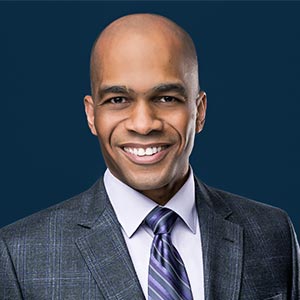Introduction of Deryck Jordan by David Wagstaff
This interview with Deryck Jordan is part of a series of articles from entrepreneurs, compiled with the goal of providing other business owners and soon-to-be business owners with a realistic view of what it takes to run a business and some of the challenges commonly faced.
I first learned about Deryck as I was reviewing applications for the Entrepreneur’s Network. What caught my attention about Deryck was that he is an entrepreneur who recently started his own law practice, operates internationally, is multilingual, helps with business formation and organizational growth and he earned his MBA from the University of Pennsylvania’s Wharton School, near where I live.
The Entrepreneur’s Network is a global group of entrepreneurs, so it could be of use to members to know an attorney who has experience in Europe and the US and who knows German, Spanish, French and English. In the interview, we learn more about his personal global story, passions and innovation.
We can see from his answers that he has an entrepreneur’s mindset, seeking to learn and solve challenges. While Deryck felt his challenges were weak, I think many aspiring entrepreneurs will relate to the challenge of letting go and taking the first step. It seems so easy, but it takes a lot to actually let go of the comfort of a job.
What led you to become an entrepreneur?
The driving forces behind my decision to become an entrepreneur were twofold: passion and introspection. One of my first passions was internationalism and foreign. . . well, foreign everything: foreign cultures, foreign affairs, foreign languages.
For example, although I’m American, I have roots in the Caribbean, have lived in different countries in Europe for almost 20 years and am now fluent in French, German and Spanish. I’ve known for a while that I am most satisfied when my career allows me to interact and collaborate with people from different countries and cultures.
My other big passion is innovation. Besides being an inventor myself (for a biotechnology patent), I also thrive when collaborating with other innovators, including entrepreneurs, licensing partners, innovation teams, inventors and advisory boards.
In that vein, I’ve developed and implemented growth strategies for companies by wearing various hats–including legal, marketing, business development and portfolio strategy. Sometimes those growth strategies involved technical innovation, including R&D strategies for cutting-edge biotechnology and novel medical devices. Other times the strategies focused on commercial innovation, like clever business models.
That’s where my introspection comes in. My managerial and operational experience in creating, developing and implementing countless business plans and product launch plans gave me the confidence and self-awareness that I had the necessary competencies and capabilities to launch and grow my own venture.
A brief description of your business and what are your aspirations for it?
Jordan Counsel is a law firm in New York and in Berlin that helps small businesses get established in the US market and grow. We accomplish this by using our experience as ‘boardroom veterans’ to provide legal solutions that are practical, business-friendly and workable.
Our law firm’s European office is in Berlin, which is the startup capital of Germany and one of the startup capitals of Europe. From this office we help European startups (and other small companies) launch their company, product or service in the US market.
All entrepreneurs know there’s a lot of red tape to cut through when starting a business; for foreign entrepreneurs, there’s even more red tape. From our Berlin office we guide these European companies through the labyrinthine process of expanding internationally to America.
Our New York office is on Wall Street, directly around the corner from the NY Stock Exchange. While that location is particularly inspiring for startups that are aiming for an IPO, we actually mostly help startups that are more focused on ‘Main Street’, as well as entrepreneurs that are only active with eCommerce.
And from this New York office we help not just North American startups, but entrepreneurs and small companies from South America, Africa, Asia and Australia that are planning their US market entry. For now, my main aspiration is to continue to witness the success of our clients and share their satisfaction when they realize their vision.
What things have you done with your business that you are proud of or work really well?
One especially cool aspect of the law firm is our collaboration with one of the most accomplished lawyers in the German life sciences industry, Dr. Christian Pertschy.
Christian, who collaborates with us as “Of Counsel”, was head of the legal department of one of Germany’s biggest privately held life science companies for more than 15 years, during which time he led that company through major corporate developments, including their expansion to the US and globally through their successful efforts in research, development and distribution of innovative products.
Because life science is one of Jordan Counsel’s key focus areas, Christian provides the firm with invaluable support on all legal matters specifically pertaining to life sciences clients.
Another thing our firm did particularly well was the methodical development of our startup packages to meet the most common unmet legal needs of entrepreneurs. To get a robust picture of those unmet needs, I didn’t want to rely strictly on my previous experience working and partnering with startup companies.
So, we did market research and then used those findings to formulate startup packages that offer resources that startups usually need during and after business formation, including contracts, eCommerce documents and training sessions.
As a result, we’ve received great feedback from entrepreneurs who are appreciative of the combination of comprehensiveness and flexibility that our startup packages offer.
What were some of your biggest challenges along the way? Have you overcome the challenges? If so how?
My biggest challenge was taking the first step. That might sound lame, but it’s a pretty daunting commitment. I finally overcame the challenge through careful planning and market research. Since I’ve had the concept in the back of my mind for more than ten years, it was actually a bit cathartic to finally draft the detailed business plan and breathe life into the idea.
I also faced another challenge related to my launch sequence. In addition to New York and Berlin, I had contemplated opening offices in Sao Paulo and/or London as a convenience for more of our international clients.
But then Brazil and the UK joined the ranks of other countries around the world with idiosyncratic election results and an uncertain business environment, so I decided it would be best to instead limit the firm’s presence to New York and Berlin. So, I guess I overcame that challenge simply by accepting it.
While I imagine that at some point in the future I may choose to establish more of a presence in other geographies, that idea is on the backburner for now.
What have you learned and what would you like to share with other entrepreneurs?
Introspection is not just about looking inside. Many entrepreneurs do some type of introspection to determine who they fundamentally are and what makes them tick. It might sound paradoxical, but when entrepreneurs do an introspective evaluations, they should not only look inwards. Rather, as an entrepreneur, your introspection must include an evaluation of how your potential stakeholders perceive you.
To put it in terms of marketing, your introspection should not just include an evaluation of your intended message; it should also evaluate how your message is actually heard and interpreted.
Is there someone or a group of people you would like to meet? For example, investors in the electrical industry, mentors in the publishing industry. A knowledgeable SEO person. Specific is helpful.
Innovators! Life science innovation has always been near to my heart, but I am also fascinated by other new technologies. The innovators I most enjoy meeting are those who are at the early stage of creating their business plan (or US launch plan, if their company has already launched in another market) and can benefit the most from my input.



